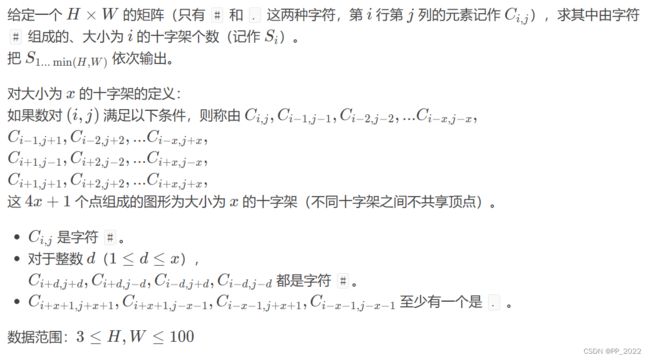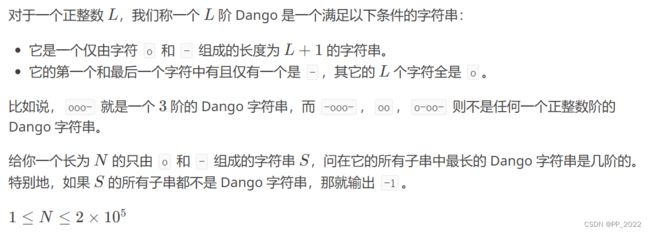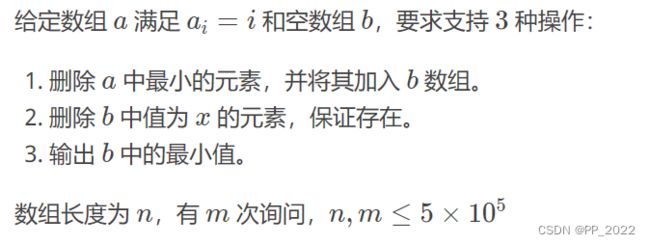2023/05/02~07 刷题记录
A - AABCC
题义:
题解:
读完题目可以想到直接暴力,但是肯定超时别想了。
因为 a b c 都是素数,所以我们可以先求出所有的素数 进行减少循环的次数,然后遍历。在遍历过程中,我们也要去进行剪枝 ,如果说 a 的五次方大于了目标值,那后面肯定就都大于了,以此类推。
import java.util.*;
public class Main {
public static void main(String[] args) {
Scanner sc = new Scanner(System.in);
long n = sc.nextLong();
// 求素数 并放入集合中
ArrayList primeNumbers = new ArrayList<>(1000);
getPrimeNumbers(n, primeNumbers);
// 使用 HashSet 集合存储答案
HashSet ans = new HashSet<>();
long a, b, c, e;
// 遍历所有可能 并使用if剪枝,如果说 a 的五次方大于了目标值,那后面肯定就都大于了
for (int i = 0; i < primeNumbers.size(); i++) {
a = primeNumbers.get(i);
if (a * a * a * a * a > n)
break;
for (int j = i + 1; j < primeNumbers.size(); j++) {
b = primeNumbers.get(j);
if (a * a * b * b * b > n)
break;
for (int k = j + 1; k < primeNumbers.size(); k++) {
c = primeNumbers.get(k);
e = a * a * b * c * c;
if (e <= n)
ans.add(e);
else
break;
}
}
}
// Set 集合中的个数 为答案的数量
System.out.println(ans.size());
}
// 求素数,埃筛
private static void getPrimeNumbers(long n, ArrayList primeNumbers) {
int len = (int) Math.sqrt(n) >> 1;
// 初始化素数
int[] temp = new int[len];
temp[0] = 1;
temp[1] = 1;
for (int i = 2; i < len; i++) {
if (temp[i] == 0) {
for (int j = i * 2; j < len; j += i) {
temp[j] = 1;
}
primeNumbers.add(i);
}
}
}
} B - Same Map in the RPG World
题义:
题解:
我们还是可以第一眼想到暴力求解,但是这个暴力不能太直接了。
我们可以把每一个点,当作是起点,然后根据这个点 去和 B 矩阵从(0, 0)开始比对。完全相同则为Yes。
import java.util.*;
public class Main {
public static void main(String[] args) {
Scanner sc = new Scanner(System.in);
int h = sc.nextInt();
int w = sc.nextInt();
sc.nextLine();
// 存放数据矩阵
char[][] a = new char[50][50];
char[][] b = new char[50][50];
for (int i = 0; i < h; i++)
a[i] = sc.nextLine().toCharArray();
for (int i = 0; i < h; i++)
b[i] = sc.nextLine().toCharArray();
// 先设为 false,遍历每一个点,把这些点当作为起点,然后和 B 矩阵对比
boolean k = false;
for (int i = 0; i < h; i++) {
for (int j = 0; j < w; j++) {
if (judge(a, b, i, j, h)) {
k = true;
break;
}
}
}
if (k)
System.out.println("Yes");
else
System.out.println("No");
}
static boolean judge(char[][] a, char[][] b, int x, int y, int h) {
int t = y;
for (int i = 0; i < h; i++) {
// 遍历 如果 x 大于了高度 h 则说明 A 矩阵已经从起点遍历到了最后 需要把 x+i 放到第一行
x = x + i >= h ? x - h : x;
y = t;
for (int j = 0; j < a[i].length; j++) {
// y 同理
y = y + j >= a[i].length ? y - a[i].length : y;
if (a[x + i][y + j] != b[i][j]) {
return false;
}
}
}
return true;
}
}C - Cross
题义:
题解:
遍历每一个点,把该点当作 X 图形的中心,求出这个点最大的 X 图形长度。既然是求最大,那么就不用考虑是否会交叉等问题。
import java.util.*;
public class Main {
public static void main(String[] args) {
Scanner sc = new Scanner(System.in);
h = sc.nextInt();
w = sc.nextInt();
sc.nextLine();
for (int i = 0; i < h; i++)
mp[i] = sc.nextLine().toCharArray();
// 遍历每一个点当作中心
for (int i = 0; i < h; i++)
for (int j = 0; j < w; j++)
if (mp[i][j] == '#')
fun(i, j);
// 输出答案
for (int i = 1; i <= Math.min(h, w); i++)
System.out.print(ans[i] + " ");
}
static int[] ans = new int[110];
static char[][] mp = new char[110][100];
static int h, w;
// 求以(x, y)为中心,最大的 X 图像为多大
static void fun(int x, int y) {
int i = 1;
while (true) {
// 越界 就退出循环
if (x - i < 0 || y - i < 0 || x + i >= h || y + i >= w)
break;
// 不能抵达 就退出循环
if (mp[x - i][y - i] != '#' || mp[x + i][y - i] != '#' || mp[x - i][y + i] != '#' || mp[x + i][y + i] != '#')
break;
i++;
}
// 存进答案数组中
ans[i - 1]++;
}
}D - Find by Query
题解:
交互题。
已知 s1 = 0,sn = 1。则不管中间是什么值,肯定会有一个分界的点,我们就是要求出这个点(任求一个)。很容易我们想到二分的方法,注意临界条件和判断条件。
import java.util.*;
public class Main {
public static void main(String[] args) {
Scanner sc = new Scanner(System.in);
int n = sc.nextInt();
// 二分 每次询问中间的值,如果是 0,则往右边靠,因为最右边是 1。
// 那肯定有一个分界点。如果是 1,同理。
int l = 1, r = n, mid, res;
while (l <= r) {
mid = (l + r) / 2;
System.out.println("?" + mid);
res = sc.nextInt();
if (res == 0)
l = mid + 1;
else
r = mid - 1;
}
System.out.println("!" + r);
}
}E - Dango
题解:
简单模拟题,注意细节就好了。
import java.util.*;
public class Main {
public static void main(String[] args) {
Scanner sc = new Scanner(System.in);
int n = sc.nextInt();
sc.nextLine();
String s = sc.nextLine();
int ans = -1, l, r = -1;
for (int i = 0; i < s.length(); i++) {
// 如果该点为 -,则看是否为最大值 尝试存入答案
if (s.charAt(i) == '-') {
l = r;
r = i;
ans = Math.max(ans, r - l - 1);
}
}
// 特殊情况,当 r == -1 则说明没有 -
// 不为 r != -1 则求 从字符串最后到 倒数第一个 - 的距离 也可能为答案
if (r != -1)
ans = Math.max(ans, s.length() - r - 1);
// 如果答案为 0,则没有 o,输出 -1
if (ans == 0)
ans--;
System.out.println(ans);
}
}F - Cards Query Problem
题义:
题解:
分别使用两个集合去存储数据。使用 ArrayList 集合当作一个盒子,把元素存进该集合中。
使用 TreeSet 集合,存储对应下标卡片,在哪些盒子中存在。(其中 因为实现了 Set 接口 所以可以自动去重,又是 TreeSet 可以自动排序)
import java.util.*;
public class Main {
public static void main(String[] args) {
Scanner sc = new Scanner(System.in);
int n = sc.nextInt();
int q = sc.nextInt();
int i, x;
// 创建两个集合,分别存放一个盒子中有的卡片
ArrayList> arrayLists = new ArrayList<>(n);
// 存放一个卡片的值 在哪些盒子中存在于 哪些盒子中,因为需要去重所以选择Set集合,又因为TreeSet自带排序
ArrayList> treeSets = new ArrayList<>(200010);
for (i = 0; i < 200010; i++)
treeSets.add(new TreeSet<>());
for (i = 0; i < n; i++)
arrayLists.add(new ArrayList<>(100));
while (q-- != 0) {
switch (sc.nextInt()) {
case 1:
x = sc.nextInt();
i = sc.nextInt();
// 放入对应的集合
treeSets.get(x).add(i);
arrayLists.get(i - 1).add(x);
break;
case 2:
i = sc.nextInt();
// 排序后输出 盒子中的全部卡片
ArrayList integers = arrayLists.get(i - 1);
Collections.sort(integers);
for (Integer integer : integers)
System.out.print(integer + " ");
System.out.println();
break;
case 3:
x = sc.nextInt();
// 输出对应卡片的集合里的 所有盒子(已经自动排序了)
TreeSet treeSet = treeSets.get(x);
for (Integer integer : treeSet)
System.out.print(integer + " ");
System.out.println();
break;
}
}
}
} H - Writing a Numeral
题义:
题解:
全程使用一个 long 类型维护。
操作一:加一个数后,进行对这个值取模。
操作二:删除最前面的数,删除时考虑 当时的位数(队列的位数),而不是维护的数值的位数。因为维护的数会被取模。而在进行减的时候,也要先进行取模,否则可能会数字过大,这里还可以使用预处理进行减少计算的时间与次数。
操作三:输出维护的这个数值。
import java.util.*;
public class Main {
public static void main(String[] args) {
Scanner sc = new Scanner(System.in);
long n = sc.nextLong();
// 需要 mod 的值
final int INF = 998244353;
// 初始化数值为 1,待会用来做乘法
long ans = 1;
// 预处理
long[] div = new long[600005];
div[0] = 1;
for (int i = 1; i < 600005; i++)
div[i] = div[i - 1] * 10 % INF;
// 使用 LinkedList 集合来存储各个位上的数字,方便尾插和弹出队头
LinkedList linkedList = new LinkedList<>();
linkedList.add(1);
for (long i = 0; i < n; i++) {
switch (sc.nextInt()) {
case 1:
// 插入队尾
int a = sc.nextInt();
linkedList.addLast(a);
ans = ans * 10 + a;
ans = myMod(ans, INF);
break;
case 2:
// 移除头节点,并将维护的数字减去这个头节点对应的值
Integer first = linkedList.removeFirst();
ans -= (long) first * div[linkedList.size()];
// 减去之后可能为负数,改为自己定义的 mod 方法
ans = myMod(ans, INF);
break;
case 3:
// 输出维护的数值
System.out.println(ans);
break;
}
}
}
// mod 可能为负数,自定义 mod
static long myMod(long x, long mod) {
x %= mod;
while (x < 0)
x += mod;
return x;
}
} J - M<=ab
题义:
题解:
阅读完题目很容易想到暴力,也就是从 M 开始,一个一个试看是否有两个数字可以相乘的值为它,并且这两个值都小于 N。但是肯定超时。。。
改变思路,我们可以从 1 开始 (设为 i),求出一个与 i 相乘 大于等于 M 且最接近 M 的值。推导出
(m + i - 1) / i;
为什么要 +i ?因为 M / i * i 的值可能会小于 M,加了 i 之后,计算出来的结果一定会使得 求出来的值 乘以 i 大于等于 M。
import java.util.*;
public class Main {
public static void main(String[] args) {
Scanner sc = new Scanner(System.in);
long n = sc.nextLong();
long m = sc.nextLong();
long k, ans = Long.MAX_VALUE;
for (long i = 1; i <= n; i++) {
// 求出一个 与 i 相乘 大于等于 M 的值,且该值为最接近 M 的
k = (m + i - 1) / i;
// 剪枝,如果 i 大于了 k 的话,其实后面的值 之前都遍历过了,break 跳出
if (i <= k) {
// 如果 k 在答案的范围内(1-n),则对比一下结果
if (k <= n)
ans = Math.min(ans, i * k);
} else {
break;
}
}
if (ans == Long.MAX_VALUE)
System.out.println(-1);
else
System.out.println(ans);
}
}K - Gap Existence
题义:
题解:
使用 HashSet 进行存储数据(包含了去重、快速查找功能)。
import java.util.*;
public class Main {
public static void main(String[] args) {
Scanner sc = new Scanner(System.in);
int n = sc.nextInt();
int x = sc.nextInt();
// 使用 HashSet 存储,满足题目的快速查找(hash值)和去重剪枝需求
HashSet hashSet = new HashSet<>(n);
for (long i = 0; i < n; i++)
hashSet.add(sc.nextInt());
// 判断是否含有这个值,a - x 的值
boolean k = false;
for (Integer a : hashSet) {
if (hashSet.contains(a - x)) {
k = true;
break;
}
}
if (k)
System.out.println("Yes");
else
System.out.println("No");
}
} L - 2xN Grid
题义:
题解:
简单模拟题。
import java.util.*;
public class Main {
public static void main(String[] args) {
Scanner sc = new Scanner(System.in);
long len = sc.nextLong();
long n1 = sc.nextLong();
long n2 = sc.nextLong();
ArrayList nodes = new ArrayList<>();
for (int i = 0; i < n1; i++)
nodes.add(new Node(sc.nextLong(), sc.nextLong()));
int now = 0;
long ans = 0, x = 0, l = 0, xx = 0, ll = 0;
for (int i = 0; i < n2; i++) {
x = sc.nextLong();
l = sc.nextLong();
// 将 B 序列的值 循环消耗完
while (l != 0) {
if (ll == 0) {
Node node = nodes.get(now++);
xx = node.x;
ll = node.l;
}
if (l <= ll) {
if (x == xx)
ans += l;
ll -= l;
l = 0;
} else {
if (x == xx)
ans += ll;
l -= ll;
ll = 0;
}
}
}
System.out.println(ans);
}
static class Node {
long x, l;
Node(long x, long l) {
this.x = x;
this.l = l;
}
}
} M - Bank
题义:
题解:
该题目对 Java 选手不太友好,这样都超时。
因为,题目只有操作二可以删除元素,而在删除之前肯定会添加该元素,所以操作一都不用管。操作三时,如果 bool 值为 true 则说明该值已经被删除了,则 ++ 判断下一个值。
import java.util.Scanner;
public class Main {
public static void main(String[] args) {
Scanner sc = new Scanner(System.in);
int n = sc.nextInt();
int q = sc.nextInt();
// 创建一个 bool 数组判断是否删除了该元素
boolean[] booleans = new boolean[n+1];
int last = 1;
for (int i = 0; i < q; i++) {
switch (sc.nextInt()) {
case 2:
// 操作二 删除一个元素
int a = sc.nextInt();
booleans[a] = true;
break;
case 3:
// 操作三 输出一个最小的没有被删除的元素
while (booleans[last])
last ++;
System.out.println(last);
break;
}
}
}
}








